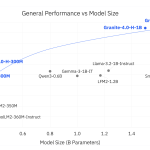IBM Releases its Smallest AI Model to Date
PositiveArtificial Intelligence

IBM has unveiled its smallest AI model yet, the Granite 4.0 Nano, which is tailored for edge and on-device applications. This development is significant as it opens up new possibilities for integrating AI into smaller devices, enhancing their capabilities while maintaining efficiency. The move reflects IBM's commitment to innovation in the AI space, making advanced technology more accessible.
— Curated by the World Pulse Now AI Editorial System







